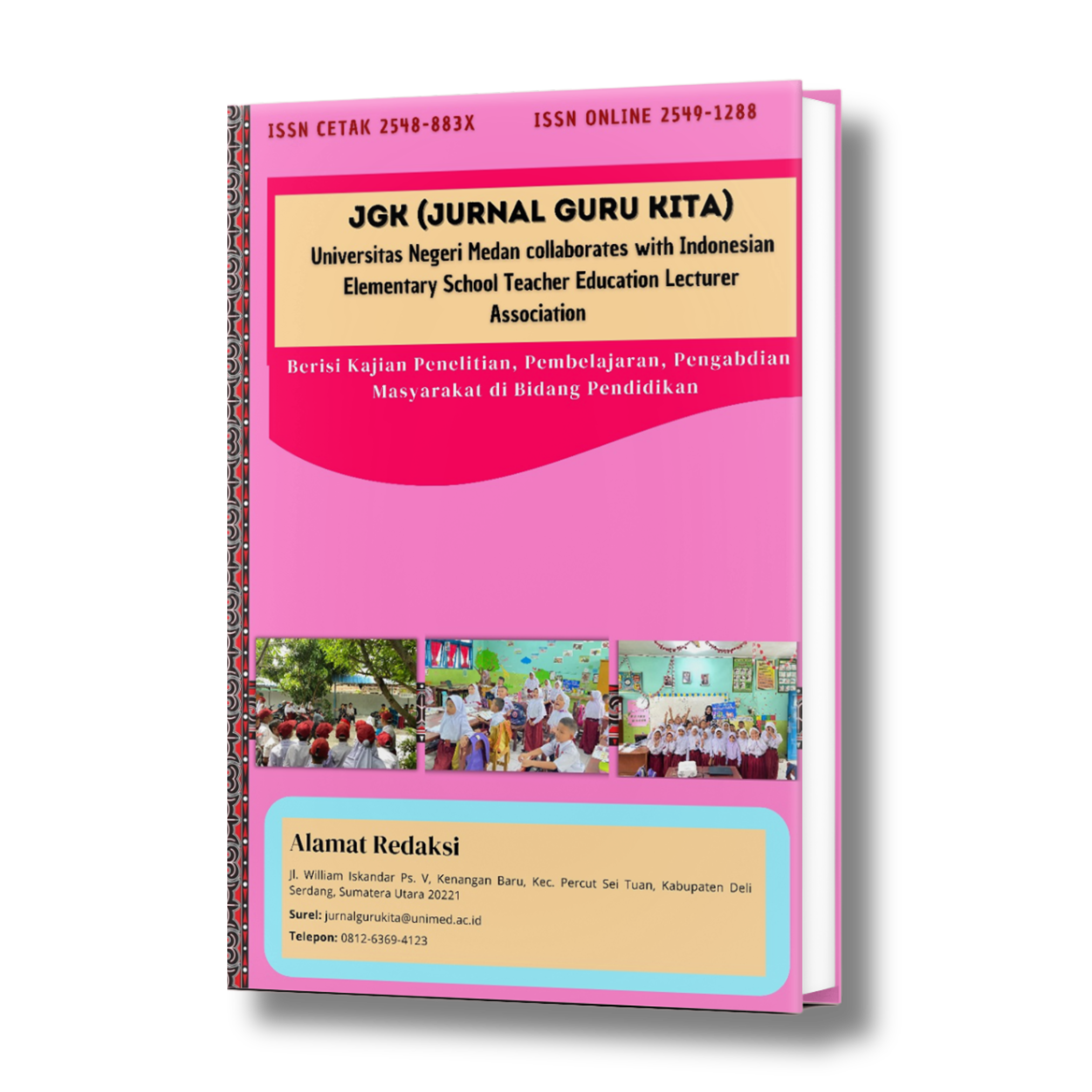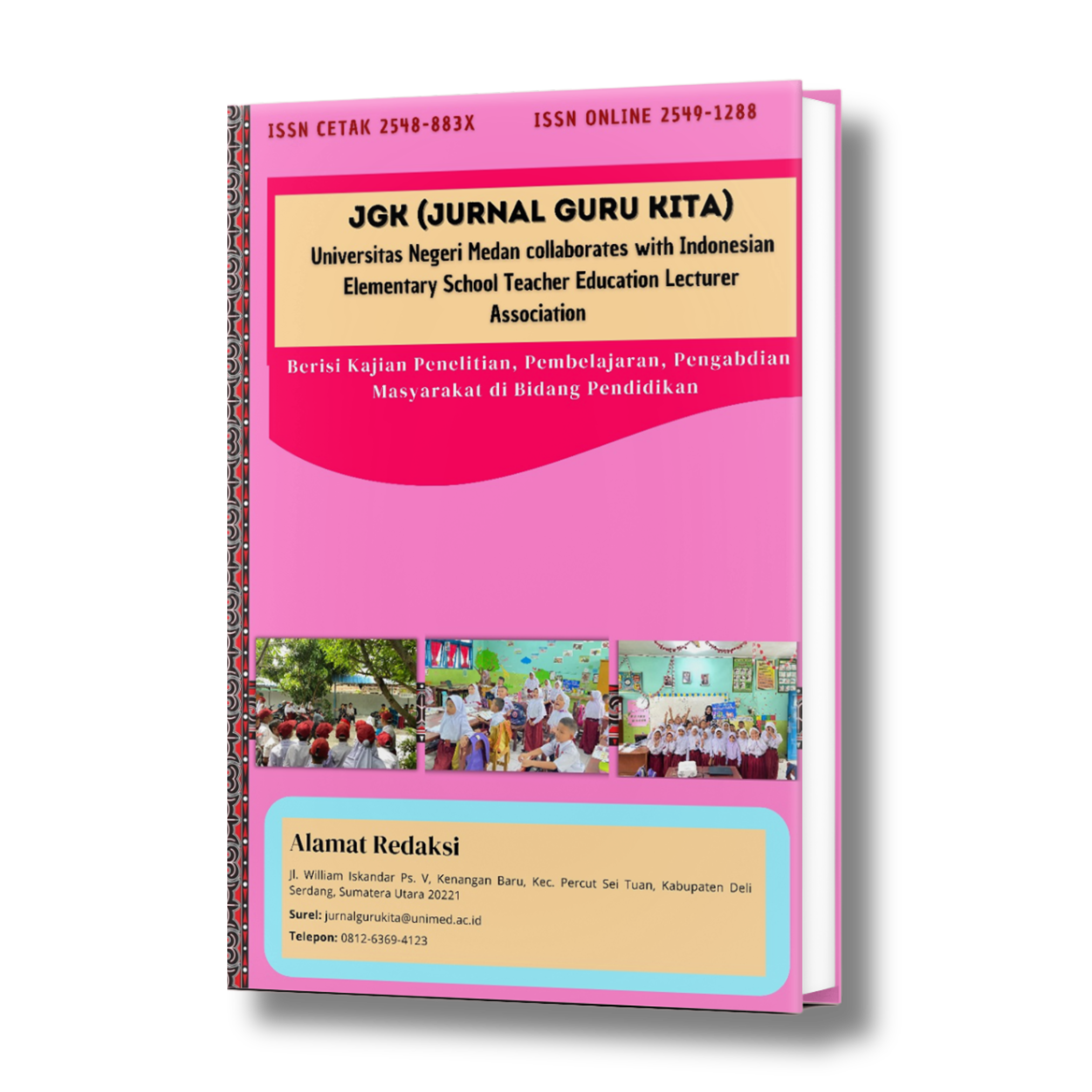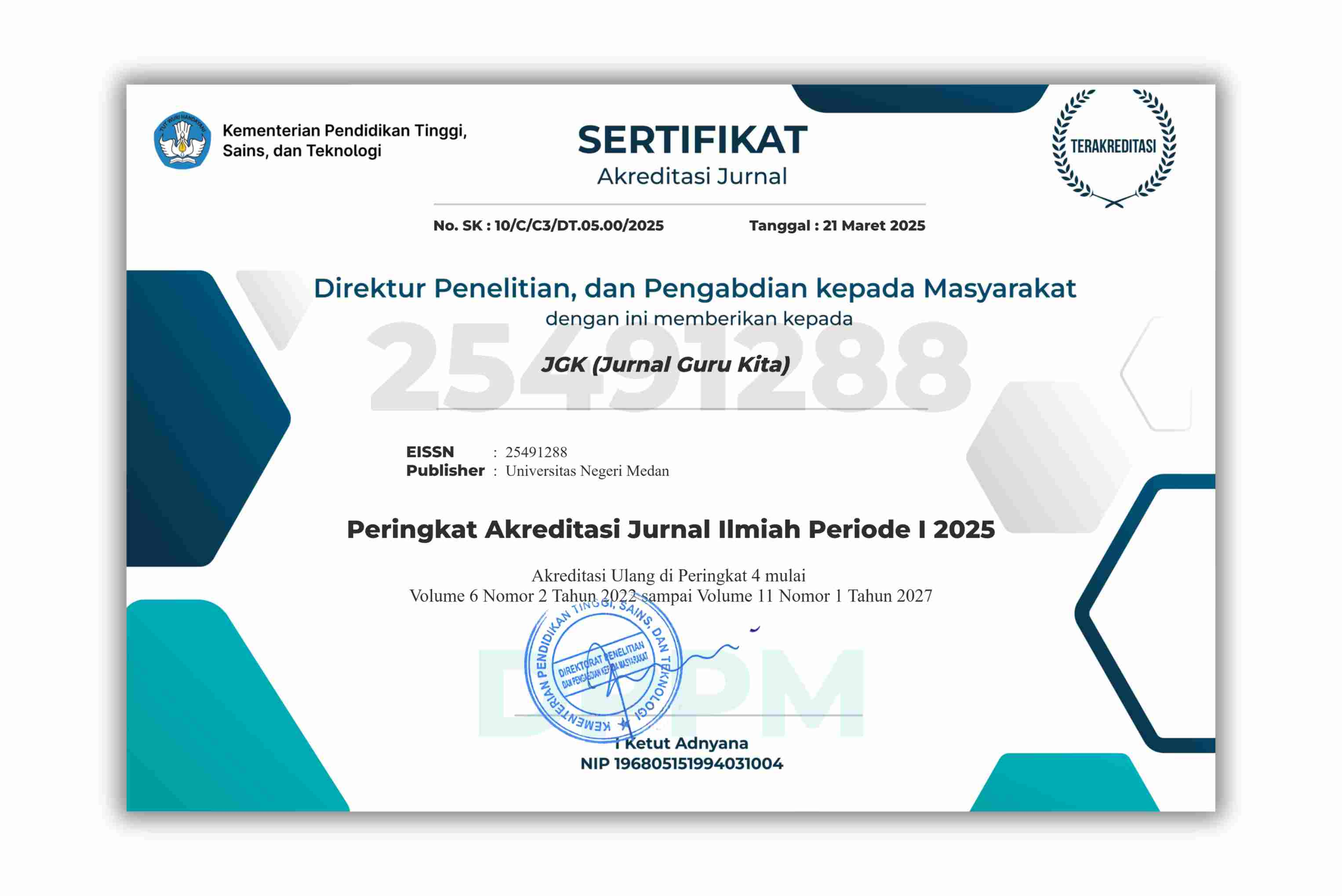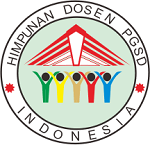Analisis Pecahan dan Perbandingan dalam Tradisi Mangan Sadari
DOI:
https://doi.org/10.24114/jgk.v9i4.66107Keywords:
Etnomatematika, Mangan Sadari, Pecahan, Pembelajaran Kontekstual, Budaya LokalAbstract
Penelitian ini bertujuan untuk mengkaji potensi integrasi tradisi budaya lokal mangan sadari dalam pembelajaran matematika sebagai sarana untuk meningkatkan pemahaman konsep pecahan dan perbandingan pada siswa sekolah dasar. Tradisi ini dipilih karena mengandung banyak aktivitas berbagi makanan yang mencerminkan konsep-konsep matematika secara konkret, seperti pembagian adil, rasio berdasarkan usia atau status sosial, serta perhitungan kebutuhan makanan secara proporsional. Penelitian ini menggunakan pendekatan kualitatif deskriptif dengan metode kajian pustaka, yang melibatkan analisis berbagai sumber seperti jurnal ilmiah, buku, dan hasil penelitian terdahulu yang relevan. Teknik analisis data dilakukan melalui analisis isi, sebagaimana disarankan oleh Krippendorff, untuk menemukan pola tematik yang bermakna. Hasil penelitian menunjukkan bahwa penggunaan konteks budaya lokal dalam pembelajaran matematika dapat meningkatkan pemahaman konsep pecahan dan perbandingan, meningkatkan motivasi belajar, serta menumbuhkan kebanggaan terhadap warisan budaya. Selain itu, pendekatan ini sejalan dengan prinsip Kurikulum Merdeka yang menekankan pembelajaran kontekstual dan bermakna. Kesimpulannya, integrasi mangan sadari dalam pembelajaran matematika dapat menjadi strategi inovatif yang efektif untuk mengaitkan konsep abstrak dengan pengalaman nyata, sekaligus memperkuat karakter dan identitas budaya siswa.References
Abdelrahim, S., Jiménez-Silva, M., Restani, R., Martin, R., & Albano, T. (2025). Leveraging Children’s Multicultural Literature to Support Students’ Math Identity and Problem Solving. Teaching for Excellence and Equity in Mathematics, 16(1). https://doi.org/10.63966/teem.v16i1.2010
Abdussamad, H. Z., & Sik, M. S. (2021). Metode penelitian kualitatif. CV. Syakir Media Press.
Acharya, B. R., Kshetree, M. P., Khanal, B., Panthi, R. K., & Belbase, S. (2021). MATHEMATICS EDUCATORS’ PERSPECTIVES ON CULTURAL RELEVANCE OF BASIC LEVEL MATHEMATICS IN NEPAL. Journal on Mathematics Education, 12(1), 17–48. https://doi.org/10.22342/jme.12.1.12955.17-48
Adrianus Sihombing, A., Anugrahsari, S., Parlina, N., & Kusumastuti, Y. S. (2021). Merdeka Belajar in an Online Learning during The Covid-19 Outbreak: Concept and Implementation. Asian Journal of University Education, 17(4), 35. https://doi.org/10.24191/ajue.v17i4.16207
Alam, A., & Mohanty, A. (2024). Unveiling the complexities of ‘Abstract Algebra’ in University Mathematics Education (UME): fostering ‘Conceptualization and Understanding’ through advanced pedagogical approaches. Cogent Education, 11(1). https://doi.org/10.1080/2331186X.2024.2355400
Ansya, Y. A., Alfianita, A., & Syahkira, H. P. (2024). OPTIMIZING MATHEMATICS LEARNING IN FIFTH GRADES: THE CRITICAL ROLE OF EVALUATION IN IMPROVING STUDENT ACHIEVEMENT AND CHARACTER. PROGRES PENDIDIKAN, 5(3), 302–311. https://prospek.unram.ac.id/index.php/PROSPEK/article/view/1120
Barbosa, A., & Vale, I. (2021). A Visual Approach for Solving Problems with Fractions. Education Sciences, 11(11), 727. https://doi.org/10.3390/educsci11110727
Byrne, E. M., Jensen, H., Thomsen, B. S., & Ramchandani, P. G. (2023). Educational interventions involving physical manipulatives for improving children’s learning and development: A scoping review. Review of Education, 11(2). https://doi.org/10.1002/rev3.3400
Christou, C., Pitta-Pantazi, D., & Chimoni, M. (2024). Teachers’ mathematical problem posing: The role of processes and complexity levels in posing problems on the fraction part-whole concept. The Journal of Mathematical Behavior, 73, 101134. https://doi.org/10.1016/j.jmathb.2024.101134
Copur-Gencturk, Y. (2021). Teachers’ conceptual understanding of fraction operations: results from a national sample of elementary school teachers. Educational Studies in Mathematics, 107(3), 525–545. https://doi.org/10.1007/s10649-021-10033-4
Dolapcioglu, S., & Doğanay, A. (2022). Development of critical thinking in mathematics classes via authentic learning: an action research. International Journal of Mathematical Education in Science and Technology, 53(6), 1363–1386. https://doi.org/10.1080/0020739X.2020.1819573
Donkoh, S. (2023). Application of triangulation in qualitative research. Journal of Applied Biotechnology & Bioengineering, 10(1), 6–9. https://doi.org/10.15406/jabb.2023.10.00319
Dwiputra, D. F. K., & Sundawa, D. (2023). Analysis of Potentials and Challenges of Culture-based Learning in Indonesia : A Systematic Literature Review. Jurnal Kependidikan: Jurnal Hasil Penelitian Dan Kajian Kepustakaan Di Bidang Pendidikan, Pengajaran Dan Pembelajaran, 9(1), 213. https://doi.org/10.33394/jk.v9i1.6556
Elsayed, W. (2024). Building a better society: The Vital role of Family’s social values in creating a culture of giving in young Children’s minds. Heliyon, 10(7), e29208. https://doi.org/10.1016/j.heliyon.2024.e29208
Ferede, A. T., Ayele, M. A., Mihrka, A. A., & Arara, A. A. (2025). The impact of contextualized teaching and learning approach on students’ conceptual understanding of trigonometry. Teaching Mathematics and Its Applications: An International Journal of the IMA. https://doi.org/10.1093/teamat/hraf008
Fitzmaurice, O., O’Meara, N., & Johnson, P. (2021). Highlighting the Relevance of Mathematics to Secondary School Students – Why and How. European Journal of STEM Education, 6(1), 07. https://doi.org/10.20897/ejsteme/10895
Frenkel, M. E., & Emara, H. (2024). ChatGPT‐3.5 and ‐4.0 and mechanical engineering: Examining performance on the FE mechanical engineering and undergraduate exams. Computer Applications in Engineering Education, 32(6). https://doi.org/10.1002/cae.22781
Guang, F., & Xueliang, Z. (2025). Research on the impact mechanisms of immersive virtual reality technology in enhancing the effectiveness of higher folk dance education: Base on student perspective. Education and Information Technologies, 30(11), 15467–15505. https://doi.org/10.1007/s10639-025-13413-y
Guo, M., Wu, L., Peng, J., & Chiu, C.-H. (2021). Research on Environmental Issue and Sustainable Consumption of Online Takeout Food—Practice and Enlightenment Based on China’s Meituan. Sustainability, 13(12), 6722. https://doi.org/10.3390/su13126722
Hadi, A., Marniati, M., Ngindana, R., Kurdi, M. S., Kurdi, M. S., & Fauziah, F. (2023). New Paradigm of Merdeka Belajar Curriculum in Schools. AL-ISHLAH: Jurnal Pendidikan, 15(2), 1497–1510. https://doi.org/10.35445/alishlah.v15i2.3126
Halimah, L., & Abdillah, F. (2021). Developing Sundanese Local Culture Literacy in Elementary School: Cross-Curricular Learning Together with Indoor and Outdoor Environment Integration. Interchange, 52(3), 319–336. https://doi.org/10.1007/s10780-021-09438-0
Handoko, Y., Wijaya, H. A., & Lestari, A. (2024). Metode Penelitian Kualitatif Panduan Praktis untuk Penelitian Administrasi Pendidikan. PT. Sonpedia Publishing Indonesia.
Hastuti, I. D., Sutarto, S., & Supiyati, S. (2024). Exploration of school mathematics material in the ethnomathematics of Sasambo culture. 030004. https://doi.org/10.1063/5.0234505
Ida, S., Aziz, R., & Irawan, W. H. (2021). CRITICAL AND CREATIVE THINKING SKILLS TO SOLVING MATH STORY PROBLEMS IN ELEMENTARY SCHOOL STUDENTS. Jurnal Tatsqif, 19(2), 98–113. https://doi.org/10.20414/jtq.v19i2.4069
Jamil, M., Batool Bokhari, T., & Iqbal, J. (2024). Incorporation of Critical Thinking Skills Development: A Case of Mathematics Curriculum for Grades I-XII. Journal of Asian Development Studies, 13(1), 375–382. https://doi.org/10.62345/jads.2024.13.1.32
Jordan, N. C., Dyson, N., Guba, T.-P., Botello, M., Suchanec-Cooper, H., & May, H. (2024). Exploring the impact of a fraction sense intervention in authentic school environments: An initial investigation. Journal of Experimental Child Psychology, 244, 105954. https://doi.org/10.1016/j.jecp.2024.105954
Keles, U., & Yazan, B. (2023). Representation of cultures and communities in a global ELT textbook: A diachronic content analysis. Language Teaching Research, 27(5), 1325–1346. https://doi.org/10.1177/1362168820976922
Klarin, A. (2024). How to conduct a bibliometric content analysis: Guidelines and contributions of content co‐occurrence or co‐word literature reviews. International Journal of Consumer Studies, 48(2). https://doi.org/10.1111/ijcs.13031
Kossybayeva, U., Shaldykova, B., Akhmanova, D., & Kulanina, S. (2022). Improving teaching in different disciplines of natural science and mathematics with innovative technologies. Education and Information Technologies, 27(6), 7869–7891. https://doi.org/10.1007/s10639-022-10955-3
Koul, S., & Nayar, B. (2021). The holistic learning educational ecosystem: A classroom 4.0 perspective. Higher Education Quarterly, 75(1), 98–112. https://doi.org/10.1111/hequ.12271
Machaba, F., & Dhlamini, J. (2021). Ethnomathematics as a Fundamental Teaching Approach (pp. 59–76). https://doi.org/10.1007/978-3-030-82723-6_5
Mania, S., & Alam, S. (2021). Teachers’ Perception toward the Use of Ethnomathematics Approach in Teaching Math. International Journal of Education in Mathematics, Science and Technology, 9(2), 282–298. https://doi.org/10.46328/ijemst.1551
Mendrofa, R. N., Dewi, I., & Simamora, E. (2024). Philosophy-Infused Culture-Based Learning Models In Mathematics Education. Mathline : Jurnal Matematika Dan Pendidikan Matematika, 9(1), 47–62. https://doi.org/10.31943/mathline.v9i1.562
Miseliunaite, B., Kliziene, I., & Cibulskas, G. (2022). Can Holistic Education Solve the World’s Problems: A Systematic Literature Review. Sustainability, 14(15), 9737. https://doi.org/10.3390/su14159737
Muhammad, A., Suhaimi, S., Zulfikar, T., Sulaiman, S., & Masrizal, M. (2021). Integration of character education based on local culture through online learning in Madras Ahaliyah. Cypriot Journal of Educational Sciences, 16(6), 3293–3304. https://doi.org/10.18844/cjes.v16i6.6559
Nabavi, A., Safari, F., Kashkooli, M., Sadat Nabavizadeh, S., & Molavi Vardanjani, H. (2024). Early prediction of cognitive impairment in adults aged 20 years and older using machine learning and biomarkers of heavy metal exposure. Current Research in Toxicology, 7, 100198. https://doi.org/10.1016/j.crtox.2024.100198
Nartin, N., Faturrahman, F., Deni, A., Santoso, Y. H., Paharuddin, P., Suacana, I. W. G., Indrayani, E., Utama, F. Y., Tarigan, W. J., & Eliyah, E. (2024). METODE PENELITIAN KUALITATIF. Cendikia Mulia Mandiri.
Novikasari, I., Muttaqin, A., & Elebiary, N. (2024). Teaching Math and Preserving Culture: The Intersection of Values in Indonesian Pedagogy. In Values and Valuing in Mathematics Education (pp. 361–379). Springer Nature Singapore. https://doi.org/10.1007/978-981-99-9454-0_17
Patel, R. (2025). Counter-hegemony and polycrisis I: how to eat and how to think. The Journal of Peasant Studies, 1–32. https://doi.org/10.1080/03066150.2025.2499271
Pavlopoulos, A., Rachiotis, T., & Maglogiannis, I. (2024). An Overview of Tools and Technologies for Anxiety and Depression Management Using AI. Applied Sciences, 14(19), 9068. https://doi.org/10.3390/app14199068
Prahmana, R. C. I. (2022). Ethno-Realistic Mathematics Education: The promising learning approach in the city of culture. SN Social Sciences, 2(12), 257. https://doi.org/10.1007/s43545-022-00571-w
Purba, A. R., Gaol, Z. D. V. I. L., Tampubolon, F., Sinaga, W., & Damanik, R. (2025). Utilization of Speech Events in the Marunjuk Custom of the Batak Toba Ethnic Group as a Medium for Learning Cultural Values in Multicultural Education. Jurnal Pembelajaran Bahasa Dan Sastra, 4(5), 1035–1050.
Recker, J., Bockelmann, T., & Barthel, F. (2024). Growing online‐to‐offline platform businesses: How Vytal became the world‐leading provider of smart reusable food packaging. Information Systems Journal, 34(1), 179–200. https://doi.org/10.1111/isj.12474
Rohmah, N., & Rosyidha, A. (2025). Educational Content in Japanese Manga: Learning Science, History, and Ethics through Pop Culture. KIRYOKU, 9(2), 431–441. https://doi.org/10.14710/kiryoku.v9i2.431-441
Rosa, M. (2023). D’Ambrosio in the Development of Ethnomodelling as. Ubiratan D’Ambrosio and Mathematics Education: Trajectory, Legacy and Future, 145.
Sakti, S. A., Endraswara, S., & Rohman, A. (2024). Revitalizing local wisdom within character education through ethnopedagogy apporach: A case study on a preschool in Yogyakarta. Heliyon, 10(10), e31370. https://doi.org/10.1016/j.heliyon.2024.e31370
Sarbaitinil, S., Rudagi, R., Rahmat, I., Elfemi, N., & Isnaini, I. (2023). Expressing Philosophical Discourse In Pencak Silat As A Pillar of Character Education And Strengthening Social Ties In Society. Journal of Pragmatics and Discourse Research, 3(2), 150–162. https://doi.org/10.51817/jpdr.v3i2.301
Schlunegger, M. C., Zumstein-Shaha, M., & Palm, R. (2024). Methodologic and Data-Analysis Triangulation in Case Studies: A Scoping Review. Western Journal of Nursing Research, 46(8), 611–622. https://doi.org/10.1177/01939459241263011
Shadiev, R., Wang, X., & Huang, Y.-M. (2021). Cross-cultural learning in virtual reality environment: facilitating cross-cultural understanding, trait emotional intelligence, and sense of presence. Educational Technology Research and Development, 69(5), 2917–2936. https://doi.org/10.1007/s11423-021-10044-1
Siagian, R. J. (2024). Examining the adaptation of Batak customs in response to social change: An assessment of the presence of Sahala and character traits. Research Journal in Advanced Humanities, 5(3). https://doi.org/10.58256/feze7416
Sihaloho, A. P. R. (2023). Mutuality of being in the batak toba community: exploring the maingain tradition in the modern era. Journal of Earth Kingdom, 1(1). https://doi.org/10.61511/jek.v1i1.2023.34
Sugiyono, S. (2022). Metode Penelitian Kuantitatif, Kualitatif Dan R&D. Alfabeta.
Sum, E. S. W., Wong, M. K. Y., Yip, A. Y. T., & Seah, W. T. (2024). Using Storytelling to Develop Fraction Concepts with Culturally and Linguistically Diverse Learners. International Journal of Science and Mathematics Education, 22(3), 633–655. https://doi.org/10.1007/s10763-023-10388-5
Suri, D., & Chandra, D. (2021). Teacher’s Strategy for Implementing Multiculturalism Education Based on Local Cultural Values and Character Building for Early Childhood Education. Journal of Ethnic and Cultural Studies, 8(4), 271–285. https://doi.org/10.29333/ejecs/937
Suryawan, I. P. P., Sudiarta, I. G. P., & Suharta, I. G. P. (2023). Students’ Critical Thinking Skills in Solving Mathematical Problems: Systematic Literature Review. Indonesian Journal Of Educational Research and Review, 6(1), 120–133. https://doi.org/10.23887/ijerr.v6i1.56462
Szkudlarek, E., Zhang, H., DeWind, N. K., & Brannon, E. M. (2022). Young Children Intuitively Divide Before They Recognize the Division Symbol. Frontiers in Human Neuroscience, 16. https://doi.org/10.3389/fnhum.2022.752190
Turner, J. R., Allen, J., Hawamdeh, S., & Mastanamma, G. (2023). The Multifaceted Sensemaking Theory: A Systematic Literature Review and Content Analysis on Sensemaking. Systems, 11(3), 145. https://doi.org/10.3390/systems11030145
Ubah, I. J. A. (2021). The impact of different approaches to the teaching of Grade 5 fraction by three experienced teachers. South African Journal of Childhood Education, 11(1). https://doi.org/10.4102/sajce.v11i1.854
Vespestad, M. K., & Clancy, A. (2021). Exploring the use of content analysis methodology in consumer research. Journal of Retailing and Consumer Services, 59, 102427. https://doi.org/10.1016/j.jretconser.2020.102427
Zainuri, A., & Huda, M. (2023). Empowering Cooperative Teamwork for Community Service Sustainability: Insights from Service Learning. Sustainability, 15(5), 4551. https://doi.org/10.3390/su15054551
Zuliana, E., Dwiningrum, S. I. A., Wijaya, A., & Hukom, J. (2025). The effect of culture-based mathematics learning instruction on mathematical skills: a meta-analytic study. Journal of Education and Learning (EduLearn), 19(1), 191–201. https://doi.org/10.11591/edulearn.v19i1.21172
Downloads
Published
How to Cite
Issue
Section
License
Copyright (c) 2025 Anggi Muliyanti, Revandika Adrianta Tarigan, Ria Septya Ningsih, Tiani Saulina Manurung, Nurhudayah Manjani, Mardhiyah Kharismayanda

This work is licensed under a Creative Commons Attribution-ShareAlike 4.0 International License.
Authors published with the JGK (Jurnal Guru Kita) agree to the following terms:
- Authors retain copyright and grant the journal the right of first publication with the work simultaneously licensed under a Creative Commons Attribution License (CC BY-SA 4.0) that allows others to share the work with an acknowledgment of the work's authorship and initial publication in this journal.
- Authors are able to enter into separate, additional contractual arrangements for the non-exclusive distribution of the journal's published version of the work (e.g., post it to an institutional repository or publish it in a book), with an acknowledgment of its initial publication in this journal.
- Authors are permitted and encouraged to post their work online (e.g., in institutional repositories or on their website) prior to and during the submission process, as it can lead to productive exchanges, as well as earlier and greater citation of published work. (See The Effect of Open Access)

























